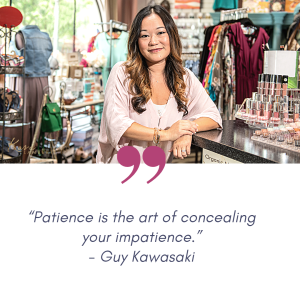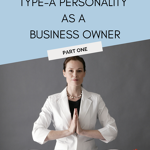Confession time, I’ve known I’ve been a Type A personality from about 2006 and that’s longer than I’ve been a business owner. It’s something I’ve struggled with and I’ve recently had to come to terms with some of the deep-rooted parts of it.
What is Type A personality?
Ok, let me address if it’s a real diagnosis, it’s not in the DSM and it’s not a personality disorder of any sort. It’s a collection of traits that were identified by a pair of cardiologists in the 1950s to predict heart disease. It’s not an “official” diagnosis.
That said, it’s widely used and it helps people find meaning and understanding. That’s what matters most in my mind.
It’s widely understood that Type A Personality is characterised by:
- Self-control
- Time urgency and impatience
- Free-floating hostility and aggression
- Competitiveness
- Strong achievement orientation
- Need for dominance
- Multi-tasking
The issue comes, like with any condition/trait/symptom, when these things prevent us from doing what we want or need to do or negatively impact on others.
How does Type A personality show up in a business owner?
So, by now you might be wondering if you might be a Type A personality. Over the years, the two most common traits I see in Type A business owners are Imposter Syndrome /or being multi-passionates.
The irony is that you don’t necessarily have to be hyper-competitive, I’m not. You don’t need to be a controlling tyrant, I’m not with others. You may not be impatient, I can be but rarely because of timeliness. You may not wish to be the best of the best, my tall poppy stops that.
Personally, I struggle with imposter syndrome which means that I am incredibly impatient and can be quite aggressive towards myself. It means that I want to ensure my clients are happy and my achievement orientation is incredibly strong for them.
I am a multi-tasker, I’m also gifted and that means I can get bored easily and I need to have a number of things “on the go” to remain mentally stimulated.
I want to be better today than I was yesterday, so I record my metrics, I make lists, I often feel that I haven’t achieved enough (even though when I tell others what I’ve done they say I’ve done too much).
Some of it isn’t that bad and some of them can leave me feeling paralysed, overwhelmed and incapable of moving forward.
Let’s break the traits down and then see what can be done.
Type A self-control and the business owner
Self-control is generally a good thing, especially as a business owner. It means that we can buckle down and get things done when they need to be. It can mean that we’re less likely to procrastinate (although Imposter Syndrome can put paid to that).
Self-control means that we can also metre our responses to some of the other traits (I’m looking at you free-floating hostility & aggression).
Being overly self-controlling can lead to being frozen in inaction, procrastination and deferring for fear of getting things wrong. Personally, I also find that it feeds my Imposter Syndrome as I perceive it as a means of another layer of expectations upon myself.
Balancing impatience as a business owner
I am working very hard to be less impatient. It doesn’t always work but it’s a work in progress. I tend to find that the more tired I am or that my frustration grows, the more impatient I become. I also tend to find that I am more patient with my clients than anyone else, including myself.
that my frustration grows, the more impatient I become. I also tend to find that I am more patient with my clients than anyone else, including myself.
Impatience isn’t always bad, it’s a boundary. Set expectations and hold them around timeliness, impatience appears. It’s only really an issue when it’s unreasonable and/or the expectations haven’t been set.
Impatience or time urgency can be a motivator.
Impatience towards others can cause conflict and demotivation.
Aggression as a business owner
We are all but human and being a business owner can mean that we can get angry. When combined with the other pressures of life, it’s no wonder we snap.
The American Psychological Association defines free-floating emotion as:
a diffuse, generalized emotional state that does not appear to be associated with any specific cause
Free-floating hostility is then a diffuse and generalised hostility that does not appear to be associated with any specific cause. It can be focused outwards and towards a person/s or inwards to ourselves, but it has no specific cause for the hostility. This can make it difficult to manage, pre-empt, or control.
Competitiveness, Type-A and being a business owner
As I write this, I’m also having a conversation in my Facebook group about comparison. One of the members said, “everybody’s fishbowl looks nicer from the outside”. Competitiveness can be specific and can start with comparison. In these instances, it’s useful to remember the fishbowl (or grass being greener) analogy and that not all things are as they appear.
Competitiveness can also be with ourselves. Wanting to improve and better previous results (like I do with my metrics).
Competitiveness becomes an issue when it removes us too far from our core beliefs, values, or goals and we become out of alignment and feel out of whack.
In business, I often see other business owners whose only driving force is the competition. They have no internal drive. They only believe that they are a success when they beat the competition, the reality is that when they’re on top they’re constantly worried that they will lose their position. Their focus is on competitiveness and not what they or their clients want.
Wow, congratulations for sticking it out this far. I hope you’re feeling ok. In the next part of the blog, I will go through the remaining characteristics of Type-A Personality, what it looks and feels like when these traits are out of balance, what it looks like when they are in balance and how you as a business owner can benefit from your Type-A personality.


